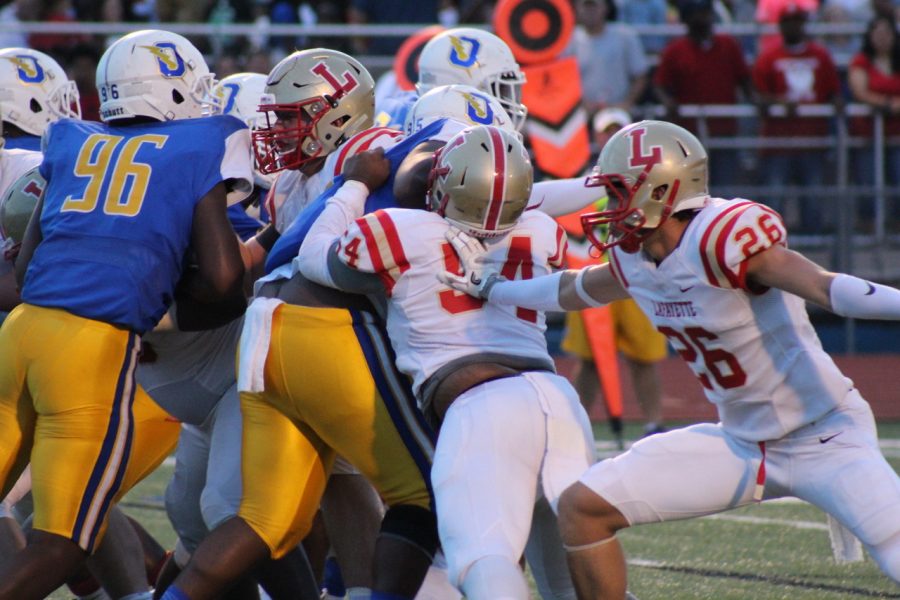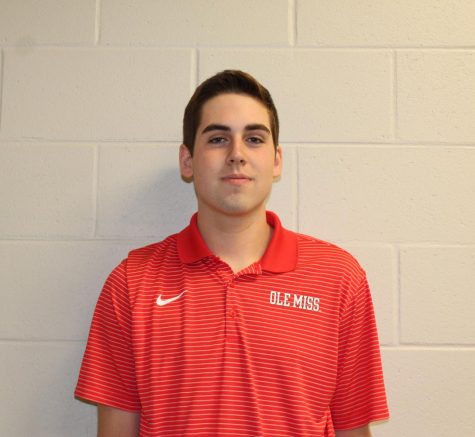ImPACT concussion baseline testing a step in the right direction in the fight against concussions
Oxford Chargers and Lafayette Commodores football players tackle each other during the annual Crosstown Classic game. ImPACT concussion baseline testing has started being offered to varsity football, basketball and soccer players.
September 21, 2018
Starting this year, varsity athletes who play football, basketball or soccer will take the ImPACT (Immediate Post Concussion Assessment and Cognitive Testing) assessment by the Mississippi Center for Health and Sports Performance. The ImPACT website describes it as a “concussion assessment tool that measures visual and verbal memory, reaction time, and processing speed, on a computer.”
While it is important for athletes of any sport to be tested for concussions, this new test format has the biggest impact on football, which has become notorious for concussions. These head injuries have lead to football players being diagnosed with CTE (Chronic Traumatic Encephalopathy), a brain disease that kills brain cells and can lead to memory loss, erratic behavior, emotional instability and much more.
“I think it’s really good, especially with all of the new scientific evidence about concussions and how they affect people,” senior tight end Joel Adamson said. “It can affect people at a young age, such as the case of Tyler Hilinski, who was diagnosed CTE after he died at 21. I feel like it’s a good idea to start doing these things, especially with kids in high school, so that when concussions do happen, we can see how it affects our brains, because it’s kind of scary.”
According to head coach Chris Cutcliffe, the test is not used to determine whether or not a player has a concussion. In the event that a player is inflicted with a concussion, the test will help ensure when they are able to get back on the field.
“Our number one priority is player safety,” Cutcliffe said. “We, as a district, will take any steps we can to ensure player safety for all of our student athletes.”
The test is FDA approved, and players’ test results will be interpreted by a licensed healthcare provider before they’re cleared to play. OHS football players have already undergone the first round of testing.
“I think the test will be pretty effective because there should be a clear difference between someone with a concussion taking the test than someone who doesn’t have a concussion,” senior offensive lineman Reece Cousar said. “It took a lot of focus for me to take the test.”
While concussion tests that are used to discover concussions involve bodily reactions, the ImPACT assessment tests mental awareness and reaction time.
“I know normal concussion tests are really physical. They make you look in certain directions, and they ask you things like ‘who are you’ and ‘where are you from’ and basic knowledge and see if your memory is ok, but this one was more testing your actual mental capabilities,” Adamson said. “They test your memory and see if you can memorize certain shapes or words and test your reaction time, like seeing different shapes and reacting as quick as you can. I guess that’s a different way to test the effects.”
In an era of football where research on the dangers of concussions has become one of the most talked about issues in the game, coaches are starting to place more emphasis on player safety.
“I believe that this is another example of the proactive approach football teams across the country are taking to ensure player safety,” Cutcliffe said. “From improved concussion testing to training coaches on safe tackling and blocking techniques, coaches at all levels of football are taking steps to ensure player safety.”





